About the College
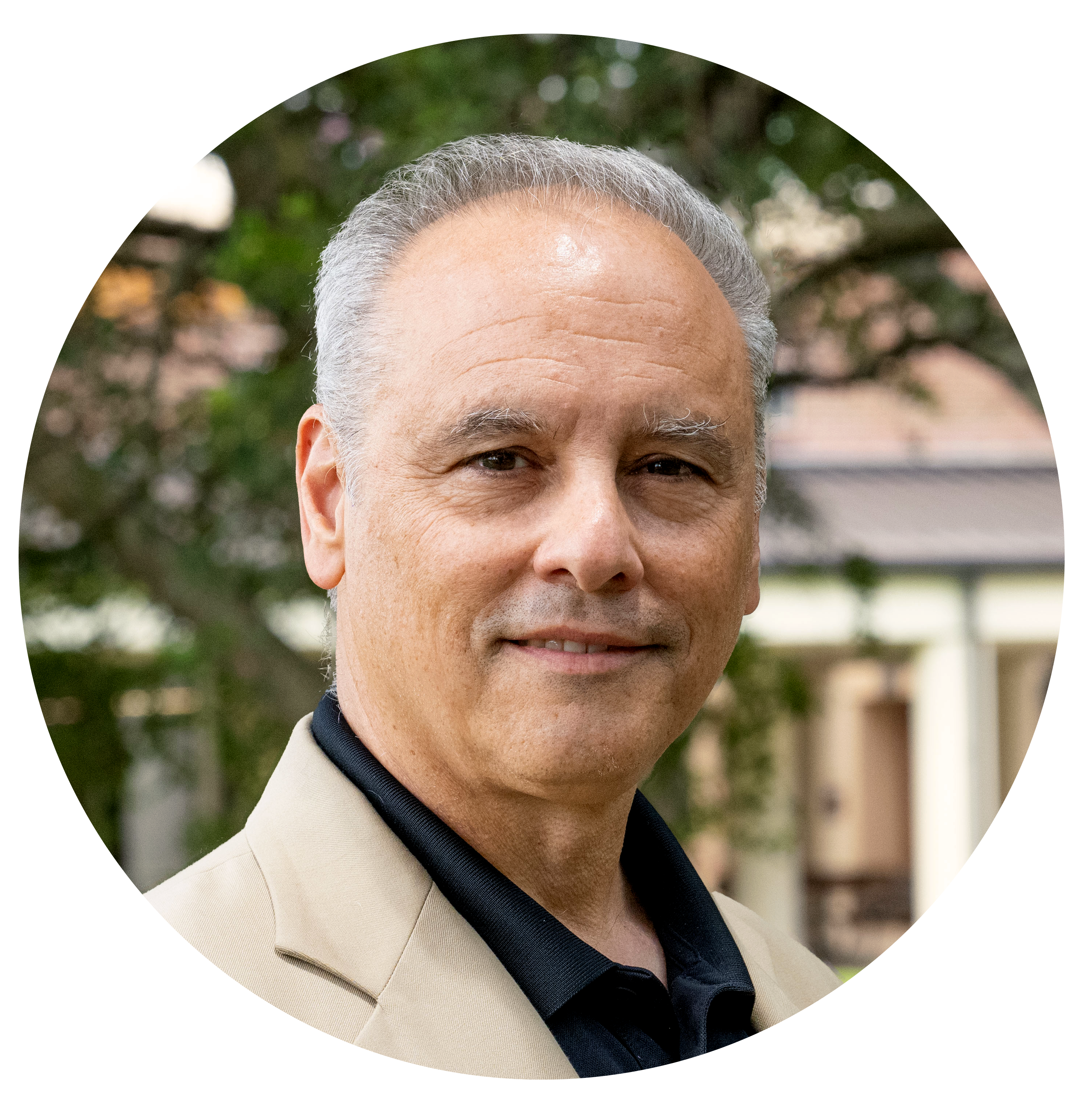
Welcome to UCF’s College of Graduate Studies
Graduate education and postdoctoral training at UCF provide many opportunities to “unleash” your potential to grow personally and professionally, enhance your career prospects, and change the world.
UCF’s College of Graduate Studies has more than 10,000 students and 350 postdoctoral scholars. They expand their knowledge and skills under the guidance of our world-renowned faculty, utilizing our state-of-the-art facilities. Our alumni have accomplished amazing feats such as discovering new species and exoplanets, serving as a Vice President of Google, winning a Daytime Emmy Award, becoming a member of the Florida House of Representatives, and developing a vaccination for a global pandemic.
Working with over 1,500 graduate faculty members representing nearly 250 graduate degree and certificate programs across 11 academic colleges, the Graduate College provides institutional oversight to improve the graduate education/postdoctoral training experience at UCF.
Whether you are taking classes or performing research at one of UCF’s campuses in metro Orlando—known as the top U.S. travel destination, the best U.S. city to start a business, and one of the top 10 fastest-growing U.S. tech hubs—or enrolled online in a highly-ranked program, the Graduate College team is here to support you. We collaborate with your academic college, school, department, and program to help you graduate and achieve your educational goals.
We are committed to supporting you as you pursue your journey, confront the challenges, and enjoy the benefits of advanced study in your chosen discipline.
Charge on!
Interim Dean
College of Graduate Studies
Mission
The UCF College of Graduate Studies provides leadership, opportunities, and services to foster high-quality learning and training environments for graduate students and postdoctoral scholars.
About Our Mission
UCF College of Graduate Studies is an advocate for postbaccalaureate education and training, working to mobilize the resources needed for graduate student and postdoctoral scholar success. We track and analyze emerging trends and changes in graduate education/postdoctoral training and provide support and guidance for our university partners. We are mindful of the need to retain the academic values of graduate programs contributing to the social and economic well-being of the community, state, nation and world.
We collaborate with the faculty to develop policies and best practices that further the high academic standards and excellence of our graduate/training programs. We focus on providing the information and services that students/postdocs need to enhance their experience with UCF and that faculty and staff need to effectively carry out their responsibilities. Cooperation with colleges, graduate programs, institutes and centers, administrative offices, and support services is emphasized to provide an excellent experience for our graduate students and postdoctoral scholars.
Through its activities and services, the UCF College of Graduate Studies contributes to program development, enrollment management, enhanced infrastructure and technological support for our educational/training programs, and quality services for diverse and talented graduate student/postdoctoral scholar populations.
Vision Statement
The college provides leadership and support services to enhance the lives and livelihoods of UCF graduate students and postdoctoral scholars through advanced education and training. In collaboration with campus units and external partners, the college leads efforts to define graduate education/postdoctoral training at UCF as one of exceptional quality.
Values Statement
- Integrity – We exercise the highest standards of integrity in everything we do. We will practice and defend academic and personal honesty. Our job performance is characterized by truthfulness, dependability, and responsibility. We seek to be known by our stakeholders as trustworthy and dependable.
- Excellence – We strive toward the highest standards of performance in all aspects of our operation. We perform every task at an exemplary level of quality. We seek to exceed the expectations of those we serve, always delivering more than we promise and setting a high standard for our hard work, knowledge, and problem-solving skills.
- Respect – We respect the rights of others to promote an open and supportive campus environment. Students will always be treated with respect and courtesy. Staff are valued for the diverse contributions that they make to the College of Graduate Studies and the university. We strive to create a welcoming environment for all.
- Service – We are primarily a service organization. As such, we recognize the importance of “customer relations” and meeting the needs of our stakeholders. We strive for quality and prompt service.
- Continual Improvement – We continually evaluate existing policies and practices, searching for ways to improve our operations. Operational initiatives are routinely examined as a basis for refining, replacing, or eliminating less effective strategies. We review and implement new technologies that will enhance our operations and service. We seek to be a leader in the application of advanced practices and technologies.
Commitment to Quality
The College of Graduate Studies serves many stakeholders. Our central focus is the students who inquire about, enroll in, and graduate from the university’s graduate programs and the postdoctoral scholars who receive advanced training with our renowned faculty members. We work closely with the staff, faculty, and administrators of the university’s colleges, schools, departments, centers, and institutes. We also support the interests and needs of our graduate programs by providing timely processing, assistance, training, and guidance. We understand that the ultimate success of our graduate programs depends in part upon the quality of our service. Thus, we are committed to providing the highest possible quality of service to all stakeholders. College of Graduate Studies employees strive to exceed the expectations of those that we serve by:
- Anticipating the needs of stakeholders
- Creating a culture that values service and fosters mutual respect
- Identifying and solving problems
- Implementing new technologies that enhance our services
- Projecting a friendly and courteous demeanor in every customer interaction
- Providing timely and accurate information
- Providing services that are convenient and accessible to all
- Removing unnecessary barriers to graduate students/postdoctoral scholar success
- Responding to all requests quickly and efficiently
- Reviewing all policies and practices regularly
- Simplifying business processes whenever possible
Leadership
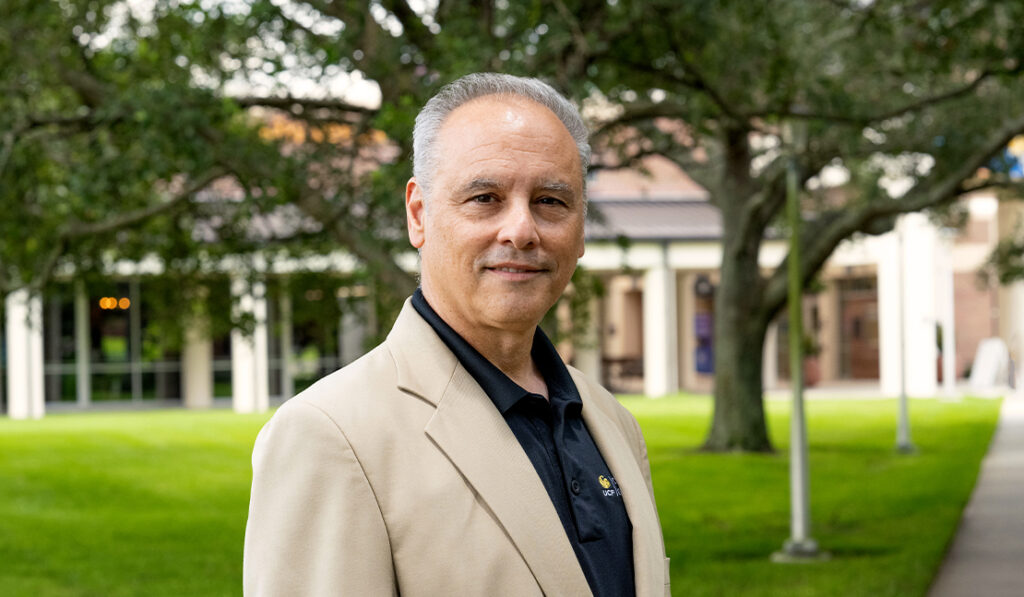
Dr. John Weishampel
Interim Dean
College of Graduate Studies
John F. Weishampel PhD is the Interim Dean of the College of Graduate Studies (CGS). He is a Professor in the Department of Biology, serving as the graduate program director for seven years, and led the development of the Conservation Biology PhD and certificate programs. He received his bachelor’s degree in biology at Duke University and his master’s and doctoral degrees in environmental sciences at the University of Virginia. Upon graduating he was a National Research Council Research Associate in the Biospheric Sciences Branch at NASA Goddard Space Flight Center. His research focused on using remote sensing techniques to characterize forest ecosystem properties to understand global environmental change.
Dr. Weishampel joined UCF in 1995. He taught courses in environmental science, ecology, and global change biology. He has mentored scores of undergraduate and graduate students and postdoctoral scholars. He secured federal funding from ED, EPA, NSF, NASA, NOAA, and USDA and received the NSF CAREER and NASA New Investigator awards. He served as a Fulbright Distinguished Research Chair in the Department of Geography at Simon Fraser University in British Columbia and as a Fulbright Senior Scholar in Remote Sensing and Landscape Systems at Albert Ludwig University of Freiburg in Germany. He has had appointments as a visiting professor at the School for Advanced Studies in the Social Sciences (EHESS) in Paris, as a Charles Bullard Fellow at Harvard University, and as a Fulbright Intercountry Scholar at the University of Zaragoza in Spain. His research career expanded into the marine environment, focusing on sea turtle ecology. While collaborating with anthropologists, he became a pioneer in the use of LiDAR remote sensing to detect archaeological features below forest canopies.
From 2015 to 2024, he was the CGS Senior Associate Dean and Director of Interdisciplinary Studies. He was responsible for new degree program development, implementing and overseeing the Office of Postdoctoral Affairs, and serving as the principal investigator on grants funded by the Alfred P. Sloan Foundation and the Council of Graduate Schools. He has served as an Intergovernmental Personnel Act (IPA) Program Officer at the National Science Foundation in the Division of Graduate Education for two years. During this time, he was responsible for administering the cross-directorate NSF Research Traineeship (NRT) and Innovations in Graduate Education (IGE) programs, which supported over 100 academic institutions and thousands of STEM graduate students. He is currently a member of the AAAS SEA (STEMM Equity Achievement) Change and Sloan Exemplary Pathways Partnership (EPP) programs.
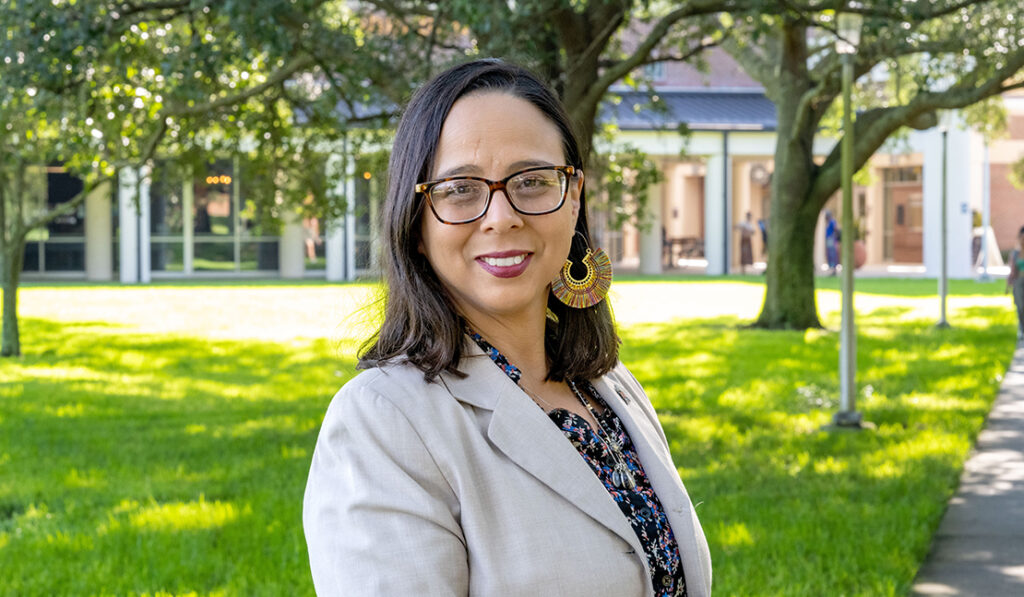
Dr. Beatriz Reyes-Foster
Interim Associate Dean
College of Graduate Studies
Dr. Beatriz Reyes-Foster (she/her/ella) is the Interim Associate Dean of the College of Graduate Studies. She manages academic progress, degree certification, and graduation processes, leads the Graduate Council Appeals Committee, and supports the Graduate Council Program Review and Awards Committee. She will also serve as the faculty advisor for the Graduate Student Association.
She is a Professor in the Department of Anthropology at UCF and served as a Graduate Program Director from 2017 through 2023. After earning her PhD in Sociocultural Anthropology from the University of California, Berkeley, she joined UCF, where she established herself as a cultural and medical anthropologist. Her research focuses on the intersections of health, medicine, and society, particularly health disparities and social inequality.
Dr. Reyes-Foster authored Psychiatric Encounters, which examines Mexico’s public psychiatric care system and the effects of neoliberal reforms. Her second book, Sharing Milk, co-authored with Shannon Carter, explores the practice of human milk sharing in the Global North and its impact on infant feeding in the US. She is developing research on psychotherapeutic interventions in the context of psychotic disorders in Mexico and writing a social history of psychiatry in Yucatan. Her work addresses coloniality, identity, health, and the intersection of religion and biomedicine.
With a distinguished academic career at UCF, she has garnered numerous accolades in teaching, research, and service. In 2021, she was honored with the prestigious Luminary Award, reflecting her exceptional contributions to the field.
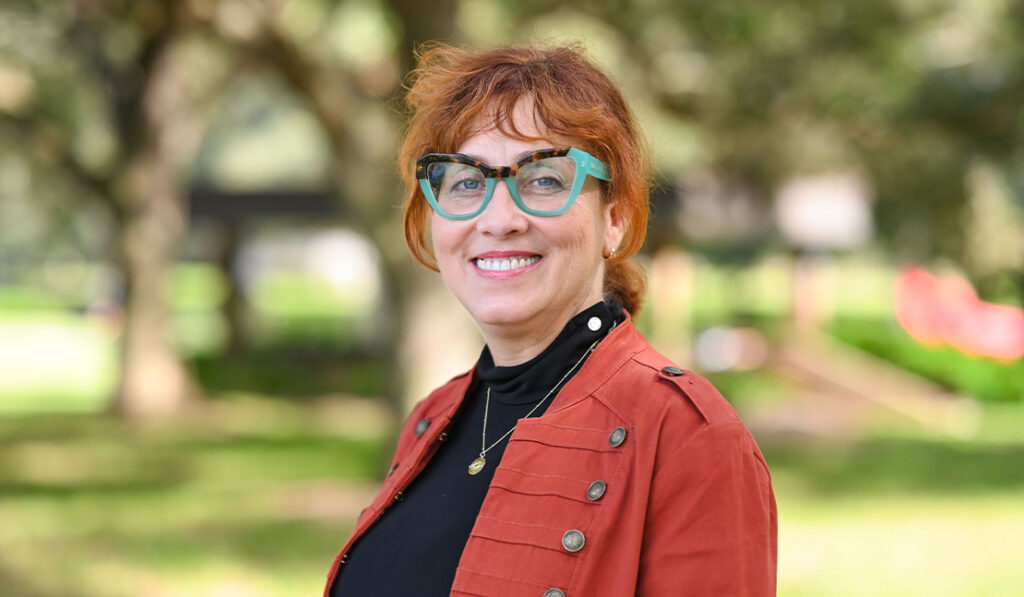
Dr. Julia Listengarten
Interim Associate Dean
College of Graduate Studies
Dr. Julia Listengarten is the Interim Associate Dean of the College of Graduate Studies. In this role, he oversees Graduate Research and Scholarship (including Graduate Faculty nominations, thesis/ dissertation committee formation, and the thesis/dissertation submission processes), interdisciplinary programs, and the Graduate Council Curriculum Committee.
Dr. Listengarten serves as a Professor and the Artistic Director of Theatre UCF, which is part of the School of Performing Arts. An artist-scholar, her research focuses on avant-garde theatre, applied drama, and socially engaged performance practices. Her work has garnered national grants and awards, recognizing her impactful community engagement projects, particularly with underrepresented populations.
Her research on contemporary theatre practices and arts-based community engagement is internationally published. Recent publications include Visual and Performing Arts Collaborations in Higher Education: Transdisciplinary Practices (with Keri Watson; Palgrave Macmillan, 2023) and Performing Arousal: Precarious Bodies and Frames of Representation (with Yana Meerzon; Bloomsbury, 2022). She co-edited the 8-volume series Decades of Modern American Playwriting: 1930–2009 (Bloomsbury, 2018) and is currently co-editing the book series Reflections on Contemporary Performance Process (with Alissa Clarke).
Dr. Listengarten was honored as a Pegasus Professor in 2020 and received the UCF Luminary Award in 2022, celebrating her contributions to the field and community.
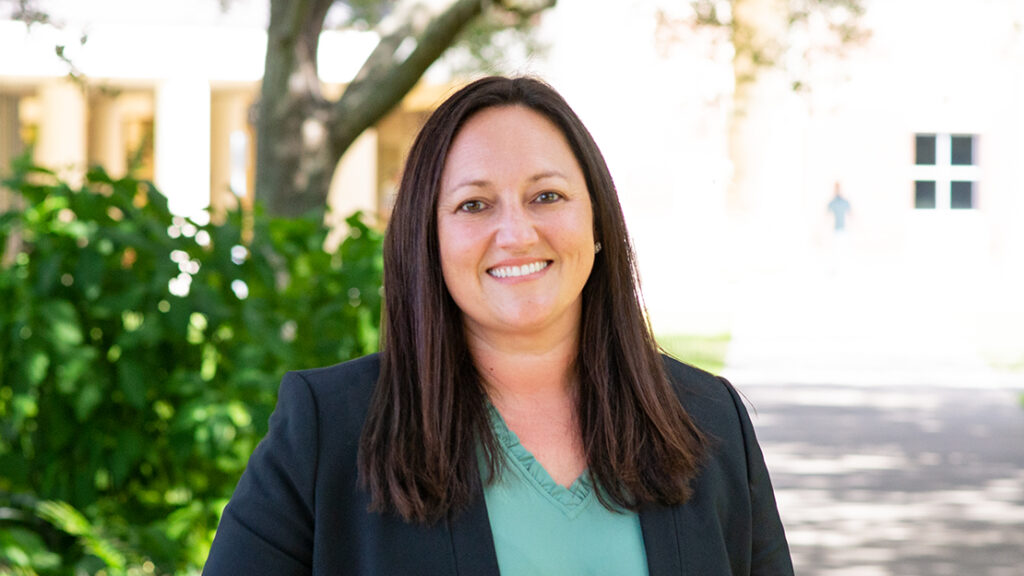
Dr. Jennifer Parham
Senior Assistant Dean
College of Graduate Studies
Dr. Jennifer Parham is a Senior Assistant Dean of Graduate Admissions, Recruiting, and Funding at UCF’s College of Graduate Studies. She received her Applied Sociology MA (2004), Instructional Technology – Instructional Systems MA (2005), and Doctor of Education (2014) from UCF. Her doctoral dissertation research focused on the challenges graduate students face in academia and their definitions and understanding of appropriate academic sharing. In her role in the College of Graduate Studies, she oversees the administration of graduate funding (fellowships, assistantship hiring, tuition support, and health insurance), as well as admissions and recruitment for the college.
About the College
The College of Graduate Studies is responsible for providing vision, leadership, and oversight for graduate education at the University of Central Florida. Working in conjunction with the Faculty Senate Committees and the college and graduate program directors, the Graduate College is responsible for developing university-wide graduate plans and policies, coordinating graduate activities, distributing tuition support and fellowships to the colleges, facilitating the adoption of new graduate programs, coordinating the recruitment of graduate applicants, admitting graduate students to the university, ensuring that academic standards are maintained, and certifying successful completion of graduation requirements and awarding graduate degrees.
Graduate Council
The College of Graduate Studies supports infrastructure for shared governance in the relationship between the College of Graduate Studies and the institution as a whole. The faculty senate is central to the institution fulfilling its academic mandate to provide a wide range of graduate programs with accountability and academic rigor. The creation, implementation, and review of courses and programs require our articulate and knowledgeable faculty community to come together to address and assess the graduate curricular activities of the campus. In this, the College of Graduate Studies provides essential policy and practical knowledge to provide oversight and stability to these activities. The graduate school also provides administrative support to the graduate council committees in the form of record keeping, completing essential paperwork, establishing agendas, and keeping meeting minutes. The graduate council has the purpose of leading the discussion on both institutional and national level dialogue related to contemporary and future matters of graduate education, curriculum, and program design/creation. This discussion can then be used to inform the activities of the four graduate council committees: 1) policy, 2) academic appeals, 3) graduate curriculum, and 4) graduate program review and awards.
- The Graduate Policy Committee is a committee of the Graduate Council. They examine and recommend policies and procedures or changes to existing policies and procedures concerning graduate education.
- The Graduate Appeals Committee is a committee of the Graduate Council. They hear petitions regarding variances to the implementation of graduate policy, variances to the application of the Golden Rule, requests from graduate program directors for exceptions to graduate policies and procedures and review all matters referred by the Graduate Council.
- The Graduate Curriculum Committee is a committee of the Graduate Council. They review curricular issues related to graduate education, including proposals for creating, revising, and deleting graduate programs, certificates, tracks, and courses. Based on their review, they make recommendations to the Dean of the College of Graduate Studies.
- The Graduate Council Program Review and Awards Committee is a committee of the Graduate Council. They provide guidance to the College of Graduate Studies about the quality of our graduate programs through recommendations to the Dean of the College of Graduate Studies. The Program Review and Awards Committee is involved in the formal program review process that examines graduate programs on a 7-year cycle by making recommendations as needed concerning the programs. The Program Review and Awards Committee also reviews new graduate degree programs, graduate faculty and scholar renominations, and the graduate student and faculty excellence awards.
Graduate Program Creation
UCF has continued its emphasis on developing quality programs that impact existing and emerging industry clusters in the region and the state. Much of this is directed at linking graduate students, faculty, and their research to business and industry. The research includes work in and across multiple disciplines such as optics and lasers, modeling and simulation, materials science, energy, biomolecular science, neuroscience, nanoscience, computer science, forensic science, education/ distributed learning, and business operations, including human factors and entrepreneurship. These research efforts establish a direction for the College of Graduate Studies in the development of new programs that provide more multi-disciplinary opportunities for our graduate students. In the development of new programs, the College of Graduate Studies provides academic, recruitment, and program administration support.
Interdisciplinary Graduate Programs
The Interdisciplinary Studies office provides master’s degree programs to students whose personal and professional goals do not fit within the disciplinary degree programs offered elsewhere at UCF. The office provides student services to interdisciplinary graduate students, from inquiry to graduation, including recruiting, admissions, academic advising, internships, mentoring, and graduation certification.
Graduate Student Association
As part of our responsibility for graduate students, the College of Graduate Studies provides direction, administrative support, and mentoring to this student government entity. We work to ensure it is a functioning body that fulfills its bylaws and represents the current needs and issues of the overall graduate student population. The graduate college also acts as a consistent entity for this student government group, as the presidency switches out yearly. The Graduate College also works through the GSA to ensure full representation of Graduate Student Senators in the Student Government.
Graduate Admissions
Graduate Admissions covers all contacts that the College of Graduate Studies has with any student applying to the non-degree, certificate, master’s, professional doctorate, or PhD programs at UCF. In this, graduate admissions are designed to provide advisement on application requirements and to provide support with any other specific questions related to the application cycle. The admissions team is also responsible for international credential evaluations and determining residency status for in-state or out-of-state students. As part of a larger institutional system, admissions must ensure open and accurate communication with UCF colleges and graduate programs around completed application materials, application recommendations, and relevant application data. The central element of this system is to link graduate admissions protocols and data to student success.
The admissions team works to be the institutional leader in providing key knowledge and oversight for admissions best practices across our graduate community. The admissions team also serves as the voice for holistic admission protocols. Holistic Admission Review is a flexible process by which applicants may prepare for and demonstrate sustainability in their chosen field of study. A holistic review has proven to be an admission strategy that can be a driver for achieving graduate academic excellence across the campus and increasing the diversity of our overall graduate population. To this end, the graduate admissions team works with all graduate programs in developing holistic infrastructures that articulate their diversity objectives and tie them to the mission of UCF and their college-level missions. Protocols such as rubrics and clearly defined workflows can enhance these admission activities, especially as it relates to holistic admission practices. As such, the admissions team are to be the leaders at UCF for admitting graduate students utilizing holistic assessments.
Graduate Recruiting
The College of Graduate Studies has a mandate to develop and implement a university recruiting plan. This effort covers all initial contact with prospective graduate students and helps them to make informed decisions about applying to UCF graduate programs. It also provides the colleges and programs with guidance, resources, and assistance regarding the recruitment of graduate students. The focus of these efforts is to help meet university goals related to enrollment management. Through our various recruitment efforts, the College of Graduate Studies seeks to support UCF in admitting and retaining graduate students who:
- harness the power of scale within the institution to transform lives and livelihoods;
- represent both demographic and professional diversity strengthening the campus;
- strive to utilize institutional resources to solve society’s challenges;
- seek out partnerships to amplify our academic, economic, cultural, and social impact; and who
- contribute to the academic, operational, and financial innovation of the higher education community.
Our recruiting team also works in collaboration with admissions and UCF colleges to assist in implementing and utilizing holistic enrollment strategies to attract, admit, and retain graduate students including those of pre-eminence. In this, the recruitment strategy strives to find graduate students and pre-eminent graduate students who bring with them attributes and dispositions of high academic quality, a specialized skill set for their field of study, a professional awareness, a defined research focus or background, and a desire to achieve articulated professional goals. These graduate students also model the fabric of our communities by representing people of diverse demographic backgrounds and people of diverse socioeconomic backgrounds. These characteristics provide a starting point for graduate program leaders and faculty to utilize recruitment and holistic admissions strategies necessary to attract potential students who exemplify these characteristics.
Graduate Student Services
UCF has certain enrollment goals that reflect both the success and growth of the institution. Enrollment goals are met through a combination of attracting new graduate students, retaining them, and encouraging persistence in the system. The College of Graduate Studies has a responsibility to support infrastructures that help graduate students persist through to graduation on time. Enrollment is a linkage between admitting new students and then helping as many of them to carry through to program completion. The secondary purpose of student services is to track the graduate students’ reality and report to the graduate community on relevant enrollment data. This communication and analysis of data can help with programmatic and institutional decisions on enrollment targets, areas for enrollment growth, marketing campaigns, recruitment efforts, and graduate student development. Central to our student services is the concept of persistence.
Persistence through a graduate academic program is a multifaceted and complex process. It is more than just taking the right classes and getting good grades. The purpose of the College of Graduate Studies Student Services is to provide the necessary infrastructures, activities, and support that can help graduate students successfully navigate all that is required to complete a degree and become prepared for their career pathway. To this end, the graduate school will use data and data-driven decision-making protocols to inform our knowledge of persistence within graduate education at UCF, leading to relevant action, interventions, and program/resource development.
Our student services infrastructure is comprised of three sub-systems: Retention, Progression, and Graduation.
Academic Services
Academic Service is all activities, programs, events, services, and business practices utilized to help graduate students be retained and persist to certificate or degree completion.
Progression
Progression is all activities, programs, events, services, and business practices utilized to help graduate students successfully navigate and complete all certificate and degree programmatic requirements. This system element also responds to all unsuccessful activities of our graduate students, including not maintaining the required GPA, graduate appeals, or certain Golden Rule violations. The system also utilizes business practices that ensure the proper and complete fulfillment of all relevant paperwork linked to our graduate students’ degree.
Graduation
Graduation is all activities, programs, events, services, and business practices for the College of Graduate Studies’ graduation responsibilities. This includes such responsibilities as events around the graduation ceremony, confirming graduation clearance, reviewing of commencement book, certifying doctoral students, and preparing the graduation script.
Graduate Funding
This office administers over $2 million in UCF graduate fellowships annually and helps students identify additional sources of financial support for graduate study. They oversee graduate tuition support, manage enrollment in student health insurance for graduate fellows and assistantship students, process graduate assistantship agreements and assessments, and administer programs such as Presentation Fellowships to support research and Parental Leave for Graduate Assistants. Through these efforts, the office ensures graduate students have the financial resources and support they need to succeed at UCF.
Graduate Student Life
This area coordinates the management of the Graduate Student Center. Additionally, this team supports graduate community events, including Graduate Orientation, 3MT Competition, and Student Research Week.
Postdoctoral Affairs
To enhance the experience of postdoctoral scholars and advance Florida’s Preeminence Program, the Office of Postdoctoral Affairs was established in 2023. Serving as a central point of contact for questions and concerns, the office also supports programs including the Preeminent Postdoctoral Program (P3), the Short-Term Postdoc Support (STePS) program, and partners with the Knight Research Scholars Program.
As part of UCF’s strategic plan, the College of Graduate Studies plays a central role in recruiting and retaining postdoctoral scholars. The college is dedicated to:
- Advocating for postdoctoral scholars and fostering a strong UCF postdoctoral community.
- Educating scholars and the campus community about graduate policies, student rights, and administrative or HR matters.
- Building professional skills and career management strategies for success both inside and outside the lab.
- Supporting faculty mentors in the recruitment, mentoring, and professional development of postdoctoral scholars.
- Collaborating with campus services to address the unique needs of postdoctoral scholars.
Communications
The Office of Communications drives the college’s voice, sharing the achievements and stories of our students, faculty, and staff through social media, websites, and creative materials. We play a central role in admissions, student life, student services, funding, and administration, helping the college inform, engage, and strengthen connections across the UCF community and beyond.
Information Technology
Information Technology supports the large-scale electronic enterprise that the College of Graduate Studies requires for the administration of graduate education.